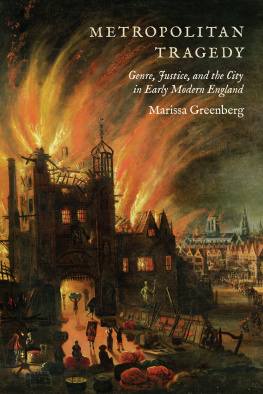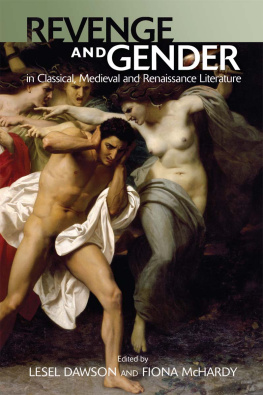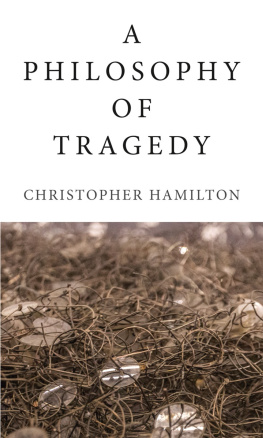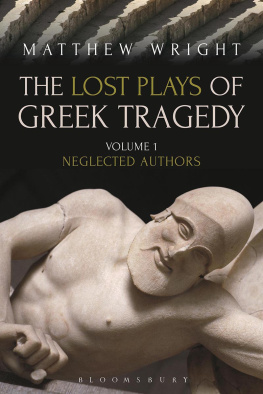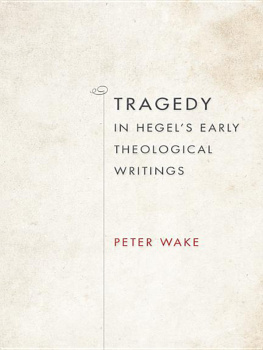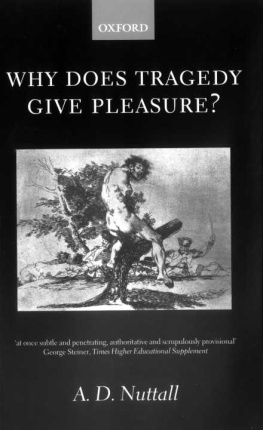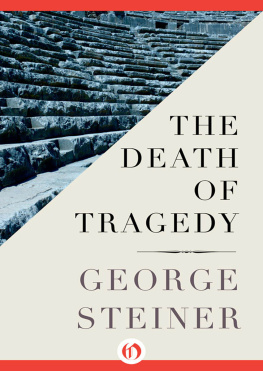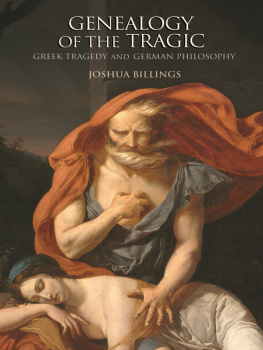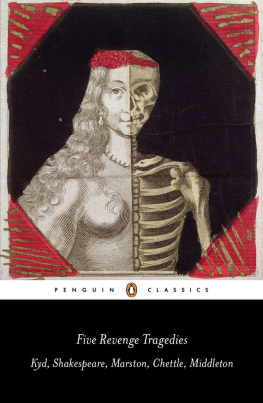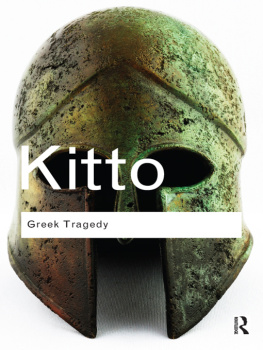Acknowledgments
Writing a book on tragedy is in many ways an exercise in gratitude. As I read about the suffering of others, I found myself profoundly thankful for the support of so many people. I am indebted to the mentors and colleagues whose rigor and generosity fundamentally shape my scholarship. Jean E. Howard advised me when I was an eager undergraduate, and in the years since, she has fostered my work in more ways than one. Stephen Cohen saw in me a promising scholar when I was a green graduate student. I am at a loss to express my gratitude for his sincerity and ardour. At the University of Pennsylvania, I was privileged to work with Margreta de Grazia, who first encouraged me to think about genre; Cary Mazer, who helped me to identify my scholarly community; and Phyllis Rackin, who urged me to find my voice, and, when I could not see the path ahead, offered candid and heartfelt advice. The Medieval-Renaissance Seminar provided me with my first and still some of my best readers, including Jennifer Higginbotham, Michelle Karnes, Kurt Schreyer, and Elizabeth Williamson. I am particularly grateful for the sustaining friendship of Jane Hwang Degenhardt, whose acuity and encouragement saved me from floundering more than once.
At the University of New Mexico, I found another supportive community, in particular Cathleen Cahill, Helen Damico, Jonathan Davis-Secord, Barry Gaines, Scarlett Higgins, Matthew Hofer, Gail Houston, Aeron Hunt, Anita Obermeier, Charles Paine, Mary Quinn, Andrew Sandoval-Strausz, and Melina Vizcano-Alemn. Jane Slaughter guided me through bureaucratic straits, and Lorenzo Garcia, Jr, provided assistance with my little Latin and less Greek. Jesse Alemn has graced me with his clear-headed, diligent, and enthusiastic mentorship. I am blessed in my fellow early modernist Carmen Nocentelli, who has become a cherished ally and friend. She read this book in its entirety at a crucial moment in its evolution, and it benefited immeasurably from her uncompromising integrity, expertise, and clarity of thought.
Earlier versions of portions of this book were presented at meetings of the Shakespeare Association of America, Renaissance Society of America, and Modern Language Association, and to the Five Colleges Renaissance Seminar, the University of Connecticut Renaissance Seminar, George Washington Medieval and Early Modern Studies Institute, and the University of Pennsylvania Medieval-Renaissance Seminar. The final version benefited in innumerable ways from the comments of my interlocutors, in particular Clare Costley Kingoo, Alan Dessen, Theresa DiPascale, Doug Eskew, Jonathan Gil Harris, D.J. Hopkins, Jonathan Hsy, Brendan Kane, James Mardock, Greg Semenza, Bruce Smith, Paul Stevens, Will West, Paul Yachnin, and Mimi Yiu. In timely conversations, Jeremy Lopez and Richard Preiss provided much-needed encouragement. I am beholden to Laura Lunger Knoppers, who, upon hearing my ideas on Milton and the Great Fire at a conference at the University of Hull, graciously offered her insights on chapter 4 .
Several grants and fellowships supported my research and gave me time to write. A National Endowment for the Humanities Award for Faculty at Hispanic-Serving Institutions allowed me to dedicate a full year to the book. Grants from the University of New Mexicos Research Allocation Committee funded archival research, and along with funds from the Department of English and the Office of the Associate Dean for Research, assisted with the costs of publication.
My thanks go to the British Museum, British Library, London Metropolitan Archives, Bridgeman Images, and Library of Congress for permission to reproduce images and manuscript materials. For permission to reprint an excerpt from Erin Gendrons In the House on Olympia Street, published in The Maple Leaf Rag IV (2010), I thank the poet and Portals Press. A version of chapter 1 appeared previously as Signs of the Crimes: Topography, Murder, and Early Modern Domestic Tragedy, in Genre 40.1 (2007): 129 (Copyright 2007 by University of Oklahoma. All rights reserved. Reprinted by permission of the present publisher, Duke University Press. www.dukeupress.edu). A version of chapter 3 and elements of the Postscript appeared as The Tyranny of Tragedy: Catharsis in England and The Roman Actor, in Renaissance Drama n.s. 39 (2011): 16396 (Copyright 2011 by Northwestern University Press. All rights reserved. Reprinted by permission of the present publisher, The University of Chicago Press. www.press.uchicago.edu). I am grateful to the editors and current publishers of these journals for rights to reproduce parts of those articles here.
My heartfelt thanks also go to Suzanne Rancourt at University of Toronto Press, who steered this book through a difficult process. I appreciate the scrutiny of my readers, which helped me to refine my argument and strengthened my resolve in its contributions.
My friends and family know how much I have needed them through the writing of this book. Betsy Raz has been unflagging in her support. Eliza Ferguson fed my body and soul more times and in more ways than I can count, and I aspire to come to lifes banquet with her fearlessness. Erika T. Lin has read every page of this book numerous times with both compassion and care, and I remain in awe of her ability to illuminate what I am trying to do. Time and again, her insights set me on track and her confidence saw me through my doubts. I would not and literally could not have written this book without her.
One of the pleasures that the publication of this book affords is that I may make good on a promise: to dedicate this book to my parents, Cynthia and Lloyd Greenberg. They instilled in me a love of theatre, encouraged my desire to brush up my Shakespeare, and gave up so much so that I might achieve my goals. I am incredibly lucky to have an extended family that has loyally followed the progress of this book: Sarah Greenberg, Andrew and Debby Greenberg, Phyllis and Steve Lyons, Dena Lyons, and especially Helaina and Paul Bardunias, for always listening. Adam Lyons has stuck by me despite the crazy and helped me write a life replete with comedy, adventure, melodrama, but never tragedy. Leam and Jamy serve up daily bottles of perspective simply by being their brilliant, affectionate, exuberant selves. They remind me of all I have to be grateful for each and every day.
METROPOLITAN TRAGEDY
Genre, Justice, and the City in Early Modern England
For my parents
Note on Texts
Unless noted otherwise, all quotations from Shakespeares plays are taken from The Norton Shakespeare, ed. Stephen Greenblatt, Walter Cohen, Jean E. Howard, and Katharine Eisaman Maus (New York: W.W. Norton, 1997). When quoting from early modern printed texts and transcriptions of manuscript sources, I have retained early modern spellings and typography, with the exception of the long s, which I have silently modernized, and superscript letters and tildes marking omitted letters, which I have lowered and italicized.
Metropolitan Tragedy
Genre, Justice, and the City in Early Modern England
MARISSA GREENBERG
UNIVERSITY OF TORONTO PRESS
Toronto Buffalo London
University of Toronto Press 2015
Toronto Buffalo London
www.utppublishing.com
Printed in the U.S.A.
ISBN 978-1-4426-4880-7

Printed on acid-free, 100% post-consumer recycled paper with vegetable-based inks.

